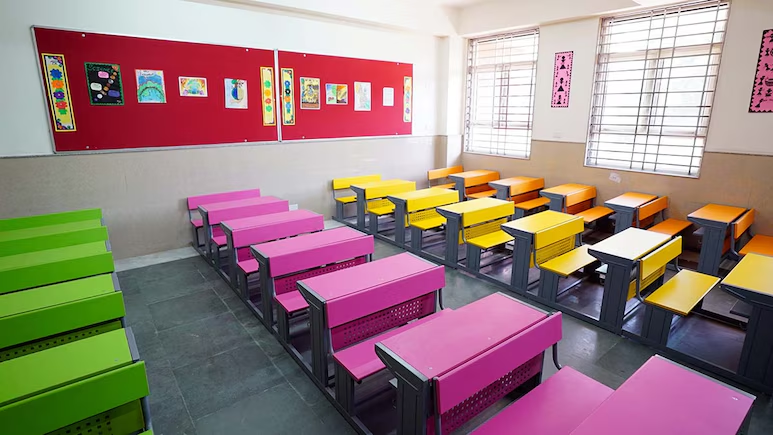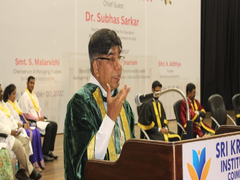
Prime Minister Narendra Modi chaired a high-level meeting on Saturday, May 7 to review the implementation of the National Education Policy (NEP) 2020. The prime minister observed that the implementation of NEP 2020 in the two years since its launch, has seen many initiatives being unrolled to achieve the objectives of access, equity, inclusivity and quality, as laid down under the policy. "From special efforts to track out of school children and bring them back into the mainstream, to introduction of multiple entry and exit in higher education, many transformative reforms have been initiated that will define and lead the progress of the country as we enter the ‘Amrit Kaal'," the release read.
At the meeting, the prime minister stressed for the adoption of technology in delivering formal education, saying a hybrid system of learning should be developed to avoid overexposure to technology in school-going children. "Online, open and multi-modal learning have been promoted vigorously by both schools and higher education institutions. SWAYAM, DIKSHA, SWAYAM PRABHA, Virtual Labs and other online resource portals have all seen sharp rise in the hits and student registrations. These portals are providing study materials in multiple Indian languages including sign language and in audio formats for the visually impaired," said Modi.
UGC has notified Open and Distance Learning (ODL) and Online Programmes Regulations under which 59 Higher Educational Institutions (HEIs) are offering 351 full-fledged Online programmes and 86 HEIs are offering 1081 ODL programmes. The permissible limit of online content in a programme has also been raised to 40 per cent, he added.
In order to encourage the start-up ecosystem during COVID-19 pandemic, 2,774 institution's innovation councils have been set up in HEIs in 28 states and 6 UTs. "Atal Ranking of Institutions on Innovation Achievement (ARIIA) aligned with NEP has been launched in December, 2021 for creating a culture of research, incubation and start-ups. 1438 institutions participated in ARIIA. 100 Institutions have been funded by AICTE with industry participation for Idea Development, Evaluation and Application (IDEA) Labs for Experiential learning rather than rote learning," said Modi.
The prime minister also took a stock of school education and higher education systems in India. In school education, initiatives like quality ECCE in Balavatika, NIPUN Bharat, Vidya Pravesh, examination reforms and innovative pedagogies like Art-Integrated Education, toy-based pedagogy are being adopted for better learning outcomes and holistic development of children.
The prime minister put a stress on on use of indigenously developed toys to develop conceptual skills in students. He also suggested that secondary schools with science labs should engage with farmers in their area for soil testing to create awareness about soil health, the release read.
The prime minister was also apprised of two new systems in higher education- multiple entry-exit and Academic Bank of Credit on Digilocker platform. Regarding the implementation of multilinguality in education, the prime minister was told that stress is being paid to vernacular languages so that lack of knowledge of English does not impede the educational attainment of any student. "With this objective in mind states are publishing bilingual/ trilingual textbooks at foundational level and content on DIKSHA platform has been made available in 33 Indian languages. NIOS has introduced Indian Sign Language (ISL) as a language subject at the Secondary Level," the release read.
The prime minister was informed about entrance exams being conducted in vernacular languages, and also the process of providing study materials and technical books in vernacular languages are being undertaken. "AICTE has developed an AI-based translation App and study material is being translated into Indian languages. Technical Book Writing is being undertaken in Hindi, Marathi, Bengali, Tamil, Telugu and Kannada. Engineering Courses are being offered in 6 Indian Languages in 19 Engineering Colleges across 10 States from 2021-22. Provision of additional 30/60 supernumerary seats in regional languages and upto 50% of sanctioned intake in regional languages has been made by AICTE," it read.
The meeting was attended by Dharmendra Pradhan, Minister of Education (MoE) and Skill Development Entrepreneurship (MSDE), Rajeev Chandrashekhar, Minister of State in MSDE, Subhash Sarkar, MoS, MoE, Annapurna Devi, MoS, MoE, Chairman UGC, Chairman AICTE, Chairman NCVET, Director NCERT and other senior officials from the Education Ministry.


